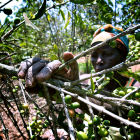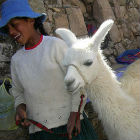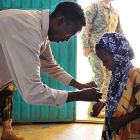 Nigeria's militant Islamist group Ansaru has proved to be a formidable threat during its short existence, using dynamite to penetrate heavily-fortified compounds and taking foreigners hostage - seven of whom it said it had killed on Saturday.
Nigeria's militant Islamist group Ansaru has proved to be a formidable threat during its short existence, using dynamite to penetrate heavily-fortified compounds and taking foreigners hostage - seven of whom it said it had killed on Saturday. "For the first time, we are glad to announce to the public the formation of this group that has genuine basis," said a statement issued by the group in January 2012 and quoted in local media.
"We will have [a] dispassionate look into everything, to encourage what is good and see to its spread and to discourage evil and try to eliminate it."
Its full Arabic name, Jama'atu Ansarul Muslimina Fi Biladis Sudan, means: "Vanguards for the Protection of Muslims in Black Africa".
This suggests that it has a wider regional agenda, with the UK listing Ansaru as a "terrorist group" linked to al-Qaeda in the Islamic Maghreb (AQIM).
Ansaru at a glance
- Based in Nigeria
- Suspected to be an off-shoot of Boko Haram, another militant Islamist group in Nigeria
- Listed by UK government as a "terrorist organisation" aligned with al-Qaeda in the Islamic Maghreb
- Released a statement in January 2012 to announce its existence
- Said it would target non-Muslims "in self-defence"
- Full Arabic name is Jama'atu Ansarul Muslimina Fi Biladis Sudan (loosely translated it means: "Vanguards for the Protection of Muslims in Black Africa")
Just two months after it was formed, the UK said the militant group had killed a Briton and an Italian taken hostage in the north-western state of Sokoto after a failed attempt to rescue them.
Then in December 2012, it abducted French national Francis Colump, 63, following an attack on a well-guarded compound in the northern town of Rimi, about 25km (15 miles) from Katsina city.About 30 Ansaru gunmen used dynamite to force their way into the compound, seizing Mr Colump who, officials, said, was working on a wind power project.
It carried out a similar attack in February 2013, capturing seven foreign nationals from a housing compound owned by the Lebanese construction company Setraco.
It said the attack was to avenge "transgressions" by European nations in Mali and Afghanistan, where Western forces are battling Islamist insurgents.
On Saturday, it released a video saying it had killed the "Christian" hostages because the UK and Nigerian forces were planning an operation to rescue them - an allegation the UK denied.
'Lost dignity of Muslims'
It has also carried out attacks on Nigerian targets.
In January 2013, Ansaru said it had carried out an attack which killed two Nigerian soldiers as they prepared to deploy to Mali.
End Quote Abu Ussamata al-Ansary
The group said it targeted the troops because the Nigerian military was joining the French-led military campaign to "demolish the Islamic empire of Mali".
French journal Jeune Afrique-L'Intelligent says Ansaru is led by the little-known Abu Ussamata al-Ansary. It quoted a statement by him as saying that the Nigerian government was "incapable of defending Muslims in inter-religious violence with Christians".
The group also said it was fighting to reclaim "the lost dignity of Muslims of black Africa" and the creation of an Islamic caliphate from Niger to Cameroon and northern Nigeria.
Analysts believe it is an off-shoot of Boko Haram, which launched an insurgency in 2009 to create an Islamic state in Nigeria, rather than across the region.
"To some, the sect headed by Ansary is seen as one that will compliment the 'struggle' by the Boko Haram sect under Imam Abubakar Shekau but to many it is an indication that all is not well with the leadership of the Boko Haram sect and that there has been conflict about its ideology and its understanding of Islam," wrote journalist Tukur Mamu in Nigeria's Desert Herald newspaper last year.
"Hence, the decision to form a new group." According to Nigeria's Standard newspaper, Ansaru has denounced Boko Haram's style of operation as "inhuman to the Muslim ummah [nation]", an apparent reference to killing of innocent Nigerians - Christian and Muslim - through bombings and assassinations.
"Islam forbids killing of innocent people, including non-Muslims. This is our belief and we stand for it," Mr al-Ansary said in the video released last year.
But Mr al-Ansary added that non-Muslims can be killed "in self-defence or if they attack Muslims", which seems to explain the killing of Nigerian soldiers to be deployed to Mali.
However, analysts say it does not justify the killing of civilian hostages - unless Ansaru holds them accountable for the actions of Western governments in countries such as Mali, Iraq and Afghanistan.
Analysts believe that Nigeria's government will find it more difficult to end the Islamist insurgency now that two groups are operating.
The government is said to be working with counter-terrorism experts from several countries - including the US and UK - in an attempt to neutralise the threat posed by Boko Haram and Ansaru, amid fears that they could worsen instability across West and central Africa.












